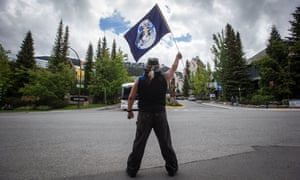Indigenous groups are fighting construction of liquified natural gas pipeline which would cross through First Nations territory
Canadian police have arrested 14 demonstrators at an indigenous
protest camp in northern British Columbia, amid growing tensions over a
proposed pipeline running through First Nations territory.
The Royal Canadian Mounted Police, Canada’s national police force, said 14 people had been arrested late on Monday as officers enforced a court order to remove barriers built along a logging road.
Indigenous groups are fighting the construction of a 670km (416 miles) liquified natural gas pipeline, Coastal GasLink, which would cross through Wet’suwet’en territory.The Royal Canadian Mounted Police, Canada’s national police force, said 14 people had been arrested late on Monday as officers enforced a court order to remove barriers built along a logging road.
On 14 December, a provincial court granted an injunction to TransCanada – the company constructing the pipeline – in order to give them access to the construction site.
In response, protesters set up the Gitimd’en checkpoint to block energy company TransCanada from accessing the planned site of construction. Dozens of demonstrators have camped for weeks, braving heavy snow and temperatures that have dipped to -15C (5F).
The Wet’suwet’en, made up of five clans, never signed a treaty ceding their land to the government of Canada, and retain control of who enters it.
Videos posted to social media showed police – some in green fatigues with military-style weapons – arresting demonstrators. At least a dozen police vehicles were present, as well as a helicopter and river boats, according to people at the scene.
The moment RCMP came over the gates and started making arrests to enforce the Coastal GasLink injunction.
A number of demonstrators retreated back along the logging roads, in the direction of the nearby Unist’ot’en Camp.
Police have set up an “exclusionary zone” to prevent access to the area – and have told those trying to access the roads they face arrest if they attempt to enter.
Organizers believe the police are headed for Unist’ot’en Camp, members of which are listed in the court injunction. “Now going into prayer,” the camp tweeted after police cleared the Gitimd’en checkpoint. TransCanada has previously said it has no intention of dismantling the camp – which is in the path of the proposed pipeline – but just wants access to the site for construction.
Unist’ot’en Camp, established on the site of a previous 2009 protest camp, has developed into a much larger facility, with a number of buildings, including a healing lodge, as well as full-time inhabitants.
Rallies in solidarity with the protesters are planned in cities across the country for Tuesday.
Perry Bellegarde, the national chief of the Assembly of First Nations, tweeted: “Everyone has the right to peaceful assembly and protest. This must be respected. Enforcing Canada’s laws means upholding human rights and First Nations rights.”


No comments:
Post a Comment